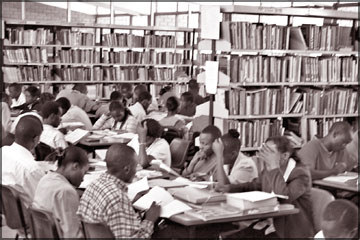Changing role of modern research library
***********
 Excerpts from the speech delivered by Higher Education Minister
Prof. Wiswa Excerpts from the speech delivered by Higher Education Minister
Prof. Wiswa
Warnapala at the Research Symposium on Information, organized by the
National
Institute of Library and Information Science, University of Colombo
March 20, 2009.
***********
The very concept of the library, both ancient and modern, has
undergone a major transformation in the last two or three decades due
primarily to the impact of modern technology. The impact of modern
technology is such that all areas of knowledge are subject to a process
of multiple transformations.
In the given context, has been identified as an aspect of
globalization. In certain spheres of activity, the process of
globalization has produced a series of complex issues whereas in other
areas it has registered some kind of uniformity in the application of
modern technology. Information and Library Sciences is one such area.
University role
The role of universities in creating knowledge is well established,
and their role in transmitting knowledge is equally important and
critical.
The role of universities in economic development came to be
highlighted recently, and the social inclusive role of universities has
assumed important.
Universities, at present, represent mass systems and they do not, as
in the past, represent the elite. In this scenario, all Governments,
both in developed and developing countries, see the university as one of
the motors of globalization. The impact of globalization is such that
knowledge has become an important factor in promoting economic growth,
and this is in the context of a revolution in both information and
communication. Knowledge accumulation and application have become major
factors in economic development and they are at the core of a country's
competitive advantage in a highly competitive global economy. Tertiary
education has become central to the creation of the intellectual
capacity on which knowledge production and utilization of knowledge
depend.
Tertiary institutions
New types of tertiary institutions and new forms of competition have
emerged, inducing all kinds of traditional institutions to change their
modes of operation and delivery. Traditional library sciences,
especially at the Universities, are now undergoing a radical change.
|

Libraries are essential in research studies |
Traditionally the university library played an important role in the
production of knowledge; both the University intellectuals and pubic
intellectuals made use of the library for producing knowledge.
For instance, Karl Marx made full use of the British Museum Library
to produce most of his seminal works. It is on the basis of the
relationship referred above that the university library became a
research library, and it, in that sense, was different from a public
library, which primarily catered to general readers who had an appetite
for general reading.
The British Museum Library became a national institution because of
its massive collection of books, and foreign scholars regarded it with
reverence.
Its Library Department - the Department of Printed Books and
Manuscripts, was a storehouse of knowledge.
In addition to these two Departments, there was the Department which
specialized on Oriental Printed Books and Manuscripts. It was after the
International Copyright Conventions of 1886 and 1908 that the Museum
Library began to develop into a main research library, and the Copyright
Acts of 1911 and 1915 further expanded its role as a research library.
All countries, especially those in the Commonwealth began to emulate
its traditions, and the universities and scholars who made use of the
library, too wanted to build libraries as research libraries.
University libraries began to develop as research libraries, and no
such library can be built within a short period and a lot depends on the
initiative of the librarian who has to be innovative.
University libraries developed as research libraries while the public
libraries, most of which were supported by local Government
institutions, remained largely as public reading rooms with a lending
collection as well.
Manuscripts in the research libraries were collected with the aim of
assembling, preserving and making available the written sources of the
main intellectual and historical activities of the world, and the
original works of such languages as Sanskrit and Pali were preserved in
this form.
Research practices
The research practices adopted by the scholars of the period differed
from the current practices, guided by modern technology. Teaching and
research are inter-linked today, and the entire learning culture has
undergone a transformation as a result of the developments in the
Information Sciences.
It is in this context that the role of the University library needs
to be assessed to see whether they still remain centres of knowledge
production. Research, undoubtedly, adds and supplements specialized
knowledge; in that sense, the research enterprise is a dynamic one, and
it articulates and promotes new knowledge.
Because of the need for institutionalized research, universities have
become centres of excellence. Knowledge production, in the present
global context, is something more than mere production of knowledge. |





